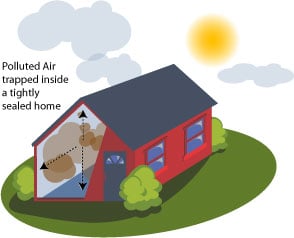
Knowing that ‘anything released indoors is about 1,000 times more likely to be breathed in than something released outdoors’ is enough to prompt most people to think about purifying the air in their homes.
While it is important, particularly for allergy sufferers, to maintain clean indoor air through air purification, it’s also important to use the right rheem equipment installation – and the first step in doing this is to be educated about what you’re getting.
As the article discusses, knowing a unit’s clean air delivery rate (CADR) and making sure your air purifier is equipped with a HEPA filter are two items to check for. In addition, if you are attempting to deal with a specific pollution issue in your home, such as smoke, make sure that your unit is equipped to deal with it. For instance, smoke and other chemical pollutants are only trapped by units fitted with carbon filters.
Another way to help purify the air in your home is to use your air conditioning unit as a kind of air cleaner. But to do this, you need to use allergen-reduction filters in your HVAC system. Vacuuming, while it gets your carpeting and upholstery cleaned, can also help clean your air. Again, make sure you use a HEPA vacuum cleaner to avoid blowing polluted, allergen-ridden air back into your home even as you’re vacuuming it up. A professional air conditioning repair technician can provide professional ac maintenance and air conditioning service and help you out if there is an issue with the ac unit to make sure that it gives clean air.
One of the most critical steps to take in keeping your home’s indoor air clean is to prevent pollutants from entering your indoor air environment in the first place. Common household items such as air fresheners, cleaning supplies, and candles, while they may mask odors, create a host of problems themselves.
Look for allergy-friendly alternatives for odor control and cleaning, and avoid any unnecessary combustion in the home – from candles or from using a fireplace, for example – whenever possible. As Dr. Kirk Smith, a professor of global environmental health at UC Berkeley puts it, ‘The best way to not have polluted air is to not have sources of pollution in the house.’
